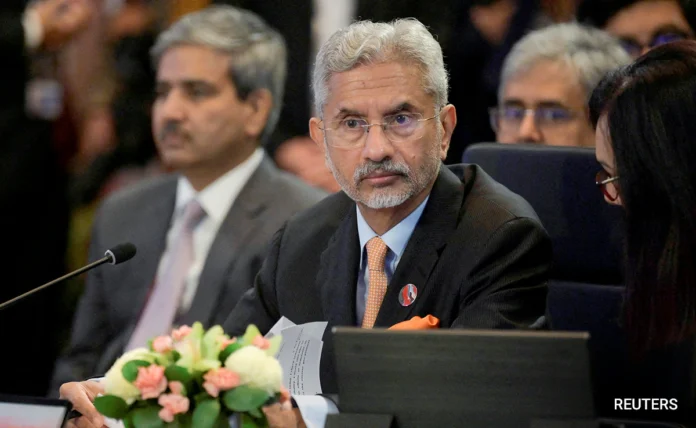New Delhi – The diplomatic standoff between India and Canada escalated further as India’s External Affairs Minister, S. Jaishankar, launched a scathing attack on Canada over its handling of recent bilateral tensions. Jaishankar, in his remarks, criticized the Canadian government for what he described as its “double standards,” a reference to the alleged leniency towards pro-Khalistani elements within Canada while expressing concerns about diplomatic norms. The strained relations between the two countries have been the subject of intense scrutiny in recent weeks, particularly after the killing of Hardeep Singh Nijjar, a Canadian citizen and Khalistani separatist leader.
The Diplomatic Rift: Background
Relations between India and Canada have been on shaky ground for years due to Ottawa’s perceived tolerance of Khalistani separatist activities. The recent tensions reached a boiling point when Canadian Prime Minister Justin Trudeau, in September 2023, publicly accused India of involvement in the assassination of Hardeep Singh Nijjar, who was gunned down in June outside a Sikh temple in British Columbia. The accusations prompted a sharp response from India, which dismissed the allegations as “absurd” and “politically motivated.”
Following these developments, both countries expelled senior diplomats from their respective capitals, further deepening the crisis. Canada’s insistence on investigating the killing and holding India accountable for any potential role has irked the Indian government, which has continuously pointed to Canada’s failure to address Khalistani extremism on its soil.
Jaishankar’s Sharp Rebuke
Speaking at a recent event, Jaishankar did not mince words in his criticism of Canada’s approach to the diplomatic situation. He called out Canada’s alleged inaction on Khalistani extremism, accusing it of applying “double standards” in how it handles internal security concerns versus foreign diplomatic issues.
“Double standards are actually mild words for what we are witnessing,” Jaishankar said. “When a country allows extremists and radicals to operate openly on its soil, inciting violence against another nation, it must take responsibility for the consequences. Canada’s permissiveness toward anti-India elements is not just hypocrisy but a serious breach of international norms.”
Jaishankar’s comments are seen as a direct response to Canada’s consistent defense of free speech and peaceful protest rights for pro-Khalistani groups, which India views as extremists seeking to destabilize the Indian state of Punjab. For years, India has expressed its displeasure at Canada’s handling of these groups, which openly advocate for the secession of Punjab from India to create an independent Sikh state known as Khalistan.
The Issue of Khalistani Extremism
The Khalistan movement, although largely dormant in India, has found pockets of support in Canada, particularly among sections of the Sikh diaspora. India has long accused certain factions in Canada of using their platform to promote violence and incite separatist activities in India. The presence of such elements, including the open commemoration of figures like Nijjar, who was designated as a terrorist by India, has strained ties between the two nations.
In his remarks, Jaishankar underlined India’s frustrations with Canada’s perceived leniency, pointing out that while Canada expects India to cooperate on matters of shared interest, it turns a blind eye to activities that undermine India’s sovereignty.
“The question we are asking is: how can you not address a serious issue like extremism that directly impacts the peace and security of another country? You cannot be selective about terrorism; you cannot say that terrorism is bad only when it happens to you,” Jaishankar added.
Diplomatic Fallout and Future Relations
Jaishankar’s statements come at a time when bilateral relations between India and Canada are at their lowest point in years. The diplomatic tit-for-tat, marked by the expulsion of diplomats and a freeze in trade talks, has sent shockwaves through diplomatic circles. Both countries have extensive economic, educational, and cultural ties, and the current stalemate threatens to impact sectors beyond politics, including trade and immigration.
India has halted visa services for Canadian nationals and issued travel advisories warning Indian citizens, especially students, to exercise caution when traveling to Canada. In return, Canada has maintained its allegations against India while calling for a transparent investigation into Nijjar’s killing.
Despite the ongoing diplomatic row, Jaishankar expressed hope that Canada would “take a more responsible approach” in addressing the concerns raised by India. He stressed that while India values its relationship with Canada, it cannot ignore the threat posed by anti-India elements openly operating within Canadian borders.
“India has always advocated for good relations based on mutual respect and adherence to international norms,” he said. “But that cannot come at the cost of allowing violence and extremism to flourish unchecked.”
As the diplomatic standoff between India and Canada continues to unfold, S. Jaishankar’s remarks signal India’s firm stance against what it perceives as Canada’s unwillingness to address its internal issues related to Khalistani extremism. The accusation of “double standards” suggests that India expects more accountability from Canada in handling these concerns. The future of India-Canada relations remains uncertain, with both nations navigating a delicate balance between addressing domestic pressures and maintaining international diplomacy.


